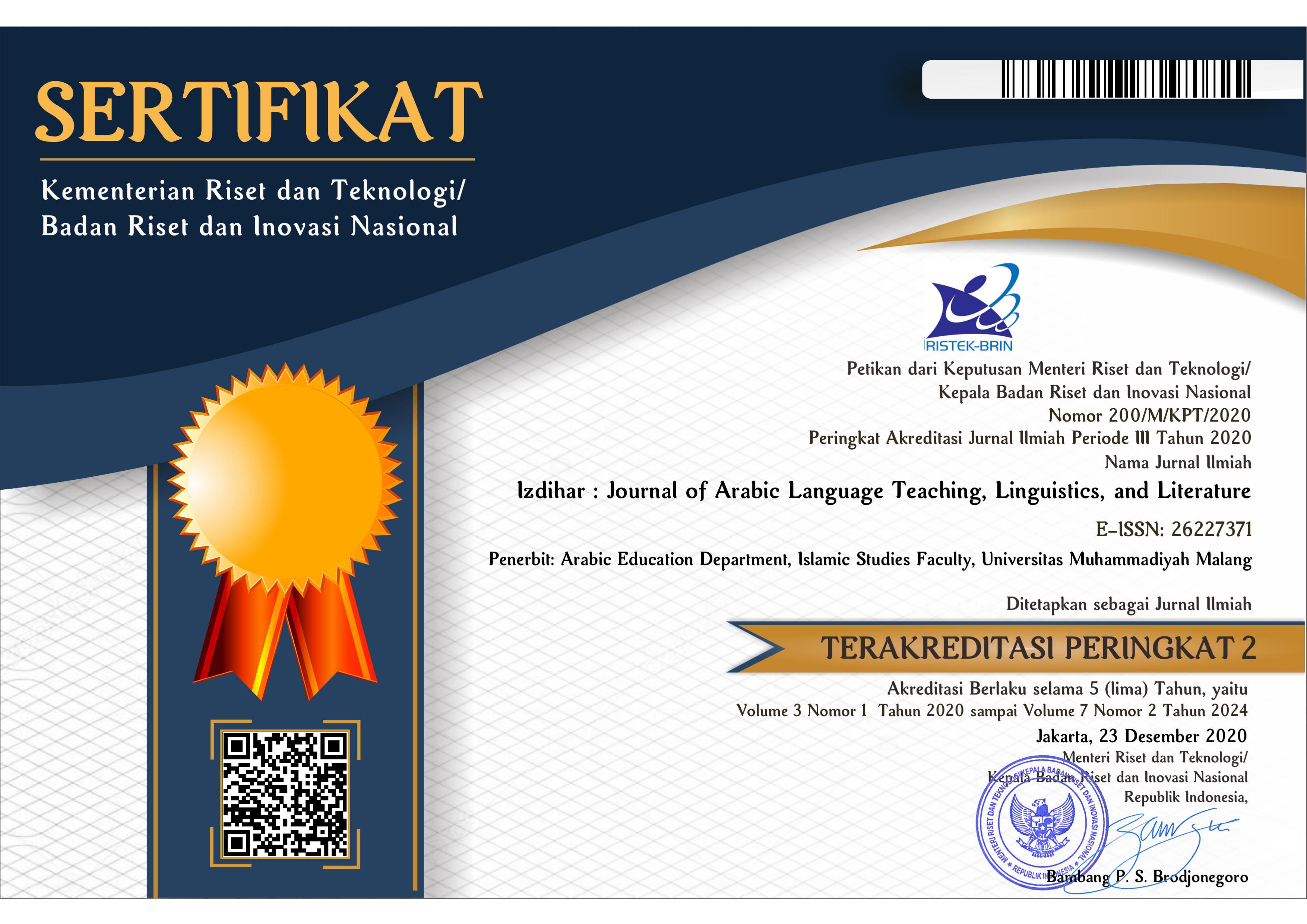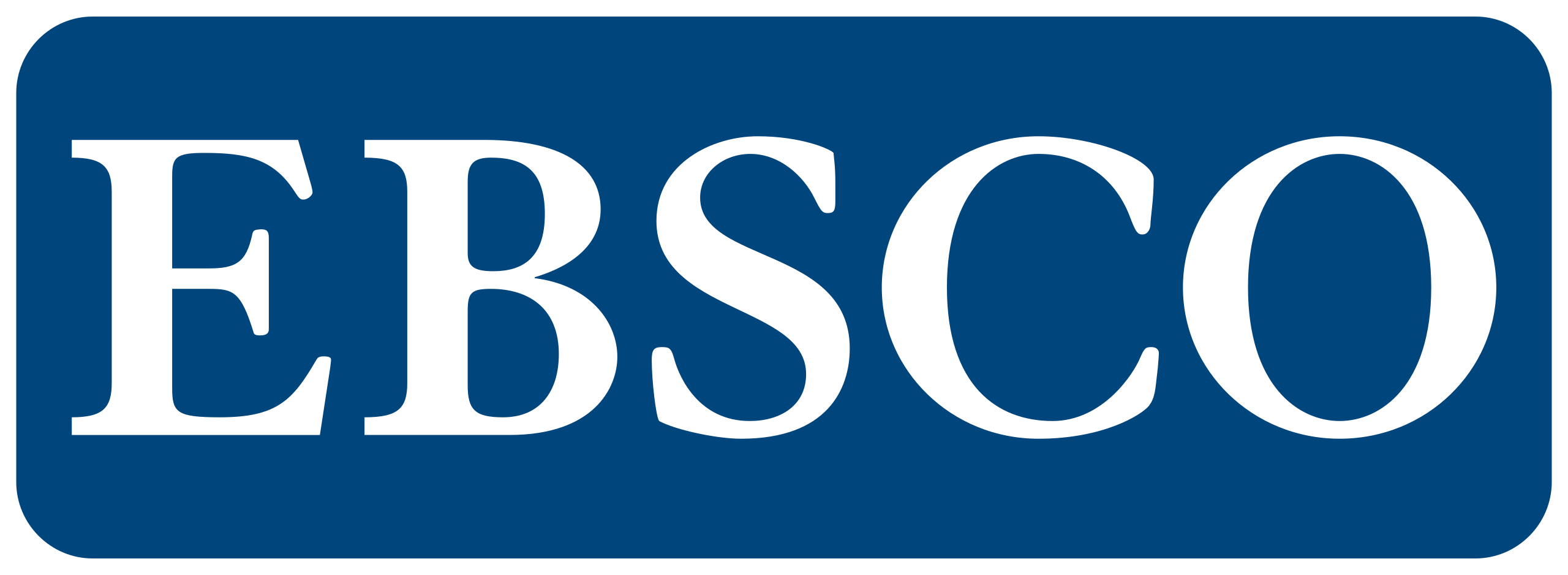Reform for The Development of Digital Arabic Language Teaching Materials Based on Constructivism Theory
DOI:
https://doi.org/10.22219/jiz.v5i3.22872Keywords:
Constructivism, Digitization, Reform, Teaching MaterialsAbstract
The purpose of this study was to provide an overview of the formulation of the development of digital Arabic teaching materials by including learning targets that are in line with the formation of active learning abilities. This study used a qualitative approach with data related to information about the pattern of developing website-based digital teaching materials. Data collection techniques used were interviews, observation, and documentation studies. As for the data analysis done by collecting, condensing, displaying data and concluding. Based on the results of the study, it was found that the development of digital teaching materials on UIN Maulana Malik Ibrahim completed adequate audio-visual-based applications integrated with the teaching materials and applied by new students through distance learning and used to develope their language skills through a constructivist learning approach that is integrated into the textbook.
Downloads
References
Aladdin, A. (2016). A needs analysis for the course materials design of the Arabic language course. International Journal of Social Science and Humanity. Vol. 6 (1). 10.7763/IJSSH.2016.V6.684
Amirudin, Noor. (2018). Development of Arabic qawaid material based on mind map for islamic higher education level. Macrothink Institute: International Research in Education, Vol. 6 (2), 75 – 87. 10.5296/ire.v6i2.13364
Aljohani, Muna. (2017). Principles of “Constructivism” in foreign language teaching. Journal of Literature and Art Studies. Vol. 7 (1), 97 – 107. 10.17265/2159-5836/2017.01.013
Andriyani, S.(2017). Applied Linguistics and Educational Linguistics.Edulingua: JurnalLinguistikTerapan dan Pendidikan Bahasa Inggris.Vol. 3 (1), 25-30. https://doi.org/10.34001/edulingua.v3i1.497
Buchori, Achmad. et all. (2015). Development Learning Model of Character Education Through E-Comic in Elementary School. International Journal of Education and Research. Vol. 3 (9) 2015. p. 384. https://www.ijern.com/journal/2015/September-2015/30.pdf
Chapelle, C. (2011). Computer Applications in Second Language Acquisition. Cambridge University Press.
Gaballo, Viviana. (2019). Digital Language Teaching and Learning: A Case Study. Presented at Innovation in Language Learning International Conference. University of Macerata.
Grabe, W. & Stoller, F. L. (2013). Teaching and Researching Reading. Routledge.
Grochola, L. (2019). The future of educational publishers. 2018. In Gaballo, Viviana. Digital Language Teaching and Learning: A Case Study. Presented at Innovation in Language Learning International Conference. University of Macerata.
Hamid, M. Abdul. Hilmi, Danial and Syaiful, M. (2019). Pengembangan Bahan Ajar Bahasa Arab Berbasis Teori Belajar Kontruktivisme Untuk Mahasiswa. Arabi: Journal of Arabic Studies. Vol. 4 (1) 2019. p. 112. DOI: 10.24865/ajas.v4i1.107
Hilmi, Danial. (2021). Impact Of Arabic Online Learning In The Perspective Of How The Brain Learns. Ijaz Arabi: Journal of Arabic Learning, Vol. 4 (1). DOI:https://doi.org/10.18860/ijazarabi.v4i1.10442
Ibrahim, Abdul Alim. (2008). al-Muwajjah al-Fanny Li Mudarrisy al-Lughah al-Arabiyyah. Darul Ma’arif.
Jia, Qiong. (2010). A Brief Study on The Implication of Constructivism Teaching Theory on Classroom Teaching Reform in Basic Education. International Education Studies. Vol 3 (2). p. 197-199. 10.5539/ies.v3n2p197
Kapur, Veena. (2018). Understanding Constructivism in The Second Language Learning Context. Scholarly Research Journal for Humanity Science & English Language. Vol. 5 (25). 7061 – 7080. https://www.srjis.com/pages/pdfFiles/151869561628.%20Dr.%20Veena%20Kapur.pdf
Lightbown, P.M. and Spada, N. (2013). How languages are Learned 4th Edition. OUP
Lora, Antonio Pareja. et all (ed). (2016). Applying Information and Communication Technologies to Language Teaching and Research: An Overview. On New Perspectives on Teaching and Working with Languages in The Digital Era. United Kingdom: The British Library. DOI: https://doi.org/10.14705/rpnet.2016.tislid2014.418
Mahliatussikah, Hanik. et all. (2020). Digital Al-Qur’an Learning Book to Improve Reading and Writing Skills Among Novice Arabic Learners. Humanities and Social Sciences Reviews Journal. Vol. 8 (2). DOI: https://doi.org/10.18510/hssr.2020.8277
Nurdin, Syafrudin. (2017). Pengembangan Kurikulum Dan Rencana Pembelajaran Semester (RPS) Berbasis KKNI Di Perguruan Tinggi. Al Fikrah: Jurnal Manajemen Pendidikan, Vol. 5 (1). DOI: https://dx.doi.org/10.31958/jaf.v5i1.813
Mutammimah, H. et. all. (2019). Inquiry-Based Learning in English Teaching at a Candidate School of IB PYP: Implementation and Benefits. Langkawi: Journal of The Association for Arabic and English. Vol. 5 (2). 115-126. DOI: https://dx.doi.org/10.31332/lkw.v5i2.1297
Richards, J. C. and Rodgers, S. T. (2014). Approaches and Method in Language Teaching. Cambridge University Press.
Risnawati, et al. (2021). Development Of Teaching Materials In Writing Descriptive Texts Of Vocational School Students. Language Literacy: Journal of Linguistics, Literature, and Language Teaching, Vol. 5 (1). DOI:10.30743/ll.v5i1.3369
Sharma, S. (2020). Constructivist Approaches to Teaching and Learning. NCERT
Tajuddin, Shafruddin. et all. (2019). Arabic material development design for senior high school. Arabiyat: Jurnal Pendidikan Bahasa Arab dan Kebahasaaraban. Vol. 6 (1). DOI: 10.15408/a.v6i1.10949
Wahyudi and Prihartini, Yogia. (2018). Development of Arabic Learning Material Based on Eclectic Method. Advances in Social Science, Education and Humanities Research, Vol. 253 (3) for Asian Education Symposium, 538 – 544. DOI:10.2991/aes-18.2019.120
Yamin, Martinis. (2011). Paradigma Baru Pembelajaran. Gaung Persada Press.
Downloads
Published
How to Cite
Issue
Section
License
Copyright (c) 2023 Nurhadi Nurhadi, Danial Hilmi

This work is licensed under a Creative Commons Attribution-ShareAlike 4.0 International License.
Copyright Notice
Authors who publish with this journal agree to the following terms:
- Authors retain copyright and grant the journal right of first publication with the work simultaneously licensed under a Creative Commons Attribution-ShareAlike 4.0 International License that allows others to share the work with an acknowledgment of the work's authorship and initial publication in this journal.
- Authors are able to enter into separate, additional contractual arrangements for the non-exclusive distribution of the journal's published version of the work (e.g., post it to an institutional repository or publish it in a book), with an acknowledgment of its initial publication in this journal.
- Authors are permitted and encouraged to post their work online (e.g., in institutional repositories or on their website) prior to and during the submission process, as it can lead to productive exchanges, as well as earlier and greater citation of published work (See The Effect of Open Access).
Copyright (c) 2019 Izdihar : Journal of Arabic Language Teaching, Linguistics, and Literature

This work is licensed under a Creative Commons Attribution-ShareAlike 4.0 International License.

















